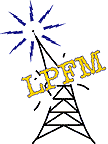Low Power FM (LPFM)
|

Examples What is
LPFM? |
On January 20, 2000 the Federal Communications Commission approved two new classes of noncommercial low power FM radio stations that will serve very localized areas. The new service will consist of two classes with maximum power levels of 10 watts and 100 watts. The 10 watt stations would reach an area with a radius of between one and two miles, the 100 watt stations would reach an area with a radius of approximately three and a half miles.
The Commission's reasoning for creating these new services was to "enhance community-oriented radio broadcasting," but in doing so they are actually condemning radio stations across the U.S. to dealing with levels of interference that many listeners will find unacceptable. Listen to the following MP3 file and decide for yourself if you think the FCC's definition of "acceptable" interference is actually "acceptable:"
This is a 8.5 MB self-extracting Zip file. Depending on your connection, it may take 5 to 40 minutes, or more to download.
Note: You will need an MP3 player (such as newer versions of Windows Media Player) to download this file. Download Instructions
An explanation of the methodology used in the simulation can be found here
The FCC is hard at work discrediting our efforts to educate the public and Members of Congress on the expected interference that new LPFM stations will cause existing FM radio services. In a recent press release, the FCC accused NAB of deliberately misrepresenting the facts.
THE FACTS SPEAK FOR THEMSELVES ...
We have included on this web page audio recordings from the technical record of the LPFM proceedings. These recordings clearly debunk the claims made by Mr. Hatfield and Mr. Stewart that crosstalk interference (as demonstrated in NAB's CD) does not occur on 3rd adjacent channels.
We emphasize that this data was not collected by NAB, but rather by other parties, including receiver manufacturers, interested in protecting the technical integrity of the FM band.
|
September 7, 2000 - Senator Grams introduceds
Radio Broadcasting Preservation Act of 2000 May 8, 2000 - Senator McCain introduces
FM Radio Act | S.
2518 [Bill Text] NAB President Eddie Fritts' Letter to Senator McCain April 13, 2000 - HOUSE PASSES H.R. 3439!!! The House of Representatives voted 274-to-110 to
pass H.R. 3439, the low-power FM bill we support. Click on the link below to view your House members’ votes on these issues. LPFM
ROLL CALL VOTES March 30, 2000 - House Commerce Committee Passes Oxley/Dingell/Wilson Compromise LPFM Bill Summary of House Commerce Committee Action March 23, 2000 - House Telecommunications Subcommittee approves the LPFM bill February 17, 2000 - House
Telecommunications Subcommittee Hearing on FCC’s Low Power FM:
Congressional Support... The following "Dear Colleague" Letters were circulated in each chamber supporting anti-LPFM legislation:
More Background Information...
|
